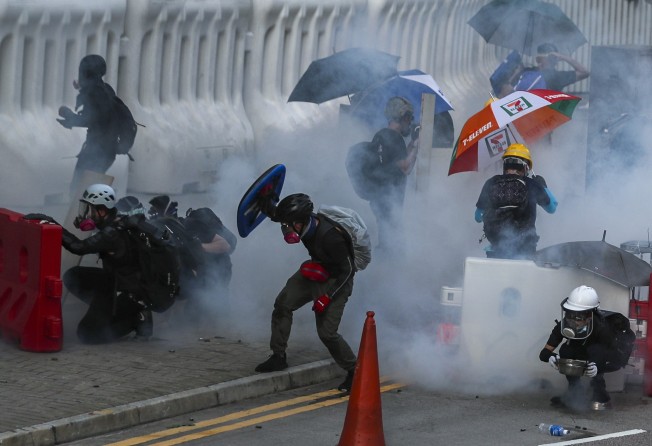China could have limited Hong Kong extradition bill protests if it had a comparably fair judicial system
- He Weifang, a professor of law at Peking University of China, questions the stagnation of judicial reform in China
- Carrie Lam’s handling of the extradition bill is improper, and deployment of People's Liberation Army would be disastrous

The current situation in Hong Kong is becoming more worrying. Hong Kong Chief Executive Carrie Lam’s handling of the extradition bill has been improper from the beginning.
That Lam would not be in her current position without the support of Beijing is not a secret. We have no idea to what extent Lam can make decisions herself on the extradition bill, however, in a city of 7 million people, it is incredible that nearly 2 million protesters flooded the streets in one single day in June, let alone those who have taken to the streets for the first time since then.
It is obvious that this bill has lost support and should not be pursued. Lam has reassured the public that “the bill is dead”, but she could have made the point in a much simpler way by adopting the legal term “withdrawn”. However, she does not seem to be able to utter that word, and there must be some reason behind that. Her mealy-mouthed attitude suggests she might be preparing for a retreat as a contingency.
There are still 28 years to go before the “one country, two systems” constitutional principle expires, but Hong Kong is in reality moving towards “one country, one system” 22 years after the handover. Hong Kong people have been unsettled by the disappearance of Hong Kong booksellers, who had been spirited away in barbaric fashion.
China’s judicial reform has stagnated since 2003 and the establishment of the National Supervisory Commission in 2018 has produced the horrible result of putting the Communist Party’s power above that of the judiciary. This is a significant reversal to the time of Chairman Mao. Even mainlanders have no confidence in the country’s judicial system, so how can Hongkongers be convinced?
Instead, Chinese authorities could use Hong Kong to perform a trial of democracy. Hong Kong’s sound legal environment and 7 million well-educated people are good foundations for free general suffrage. The city used to lead the global rankings for freedom and lack of corruption in government, but its scores have been dropping steadily in the past few years.
The British won the respect of many Hong Kong people for their political wisdom during the colonial period. They allowed heated public discussions and even fierce debates on colonial affairs within the parliament, but Hong Kong could always find support and sympathy from colonial authorities, which undoubtedly eased their dissatisfaction with the British colonial rule and even fostered some local forces to support the British.
These rational debates and the tolerance for different views played a cohesive rather than divisive role in both internal and external affairs in Britain, as the consensus reached through free expression was solid and powerful.
If China were to have had a comparably fair judicial system, the Hong Kong people would not have protested so vehemently against the extradition bill
If China were to have had a comparably fair judicial system, the Hong Kong people would not have protested so vehemently against the extradition bill.
Hong Kong demonstrators have been urging the government to meet their five demands over the now-suspended extradition bill. Even though the demands are reasonable, it is impossible for the government to meet all of them, especially the “implementation of universal suffrage”.
However, it is realistic for the Hong Kong government to set up an independent commission to examine whether excessive force was used by the police, whether any “protesters” were deliberately inciting violence among the demonstrators, and what is behind the Yuen Long mob attacks. This is something that the Hong Kong government can decide on its own, rather than defer to the central government.
Given that a majority of the public has no confidence in the city’s executive, the independent commission should involve legislators and judges with high credibility. The commission should also try to offer guidance to the government on how to deal with similar crises in the future.
Lam should also take some responsibility for the consequence of the current unrest, as she rushed the controversial extradition bill through the legislature, without leaving enough time for hearings and public debate. Any sensible executive would have resigned over the uproar caused by the bill, however, the dilemma for Lam is that her resignation would embarrass Beijing.
China is currently beset with difficulties on diplomacy and trade. Deploying the PLA to Hong Kong without an extremely prudent evaluation would be disastrous
The Chinese propaganda machine has launched an offensive to control the narrative about the Hong Kong protests using abusive and colloquial language, which has irritated many Hong Kong people. It is very worrying that the confrontations has become normal and are moving in an increasingly violent direction.
A particular concern is that under Article 14 of the Garrison Law, the Hong Kong government has room to request that the central government deploy the People's Liberation Army’s (PLA) Hong Kong garrison to maintain public order.
But Hong Kong is different from Beijing, where the authorities had kept a tight rein on information and brutally put down the student-led demonstrations in 1989. The whole world is now watching Hong Kong, and whether Beijing suppress the protests using the PLA. If that were to happen, Hong Kong’s special trade status would be jeopardised, creating huge uncertainty for China that the country could hardly bear.
China is currently beset with difficulties on diplomacy and trade. Deploying the PLA to Hong Kong without an extremely prudent evaluation would be disastrous.
He Weifang is a professor of law at Peking University of China.